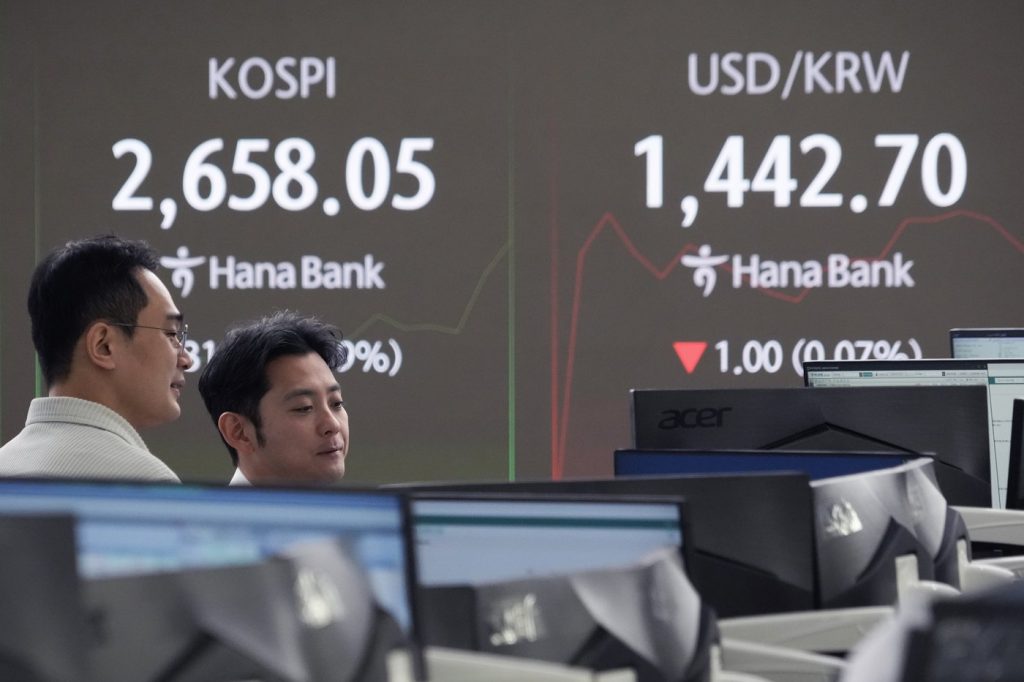TOKYO (AP) – Asian shares experienced a mostly lower trend on Thursday as traders reacted to a quiet trading day on Wall Street, where the S&P 500 continued to add to its record highs. Investor sentiment remained heavily impacted by concerns surrounding U.S. President Donald Trump's tariff policies.
In Japan, the benchmark Nikkei 225 index fell 1.5% during morning trading, settling at 38,579.71. Australia’s S&P/ASX 200 index decreased by 1.4%, reaching 8,297.60, and South Korea’s Kospi index lost nearly 0.5%, dropping to 2,659.22. In Hong Kong, the Hang Seng index dropped 1.6% to 22,569.12 following China's decision to keep its benchmark interest rate unchanged, a move aimed at maintaining financial stability. Meanwhile, the Shanghai Composite index witnessed a slight decline of 0.2%, finishing at 3,345.52.
Stephen Innes, managing partner at SPI Asset Management, commented, “The yuan has been under siege, with foreign-exchange outflows surging last month as Trump's tariff rhetoric sent shockwaves through markets.” These concerns have led to a cautious trading atmosphere across the region.
On Wall Street, the S&P 500 saw a modest increase of 0.2% following its previous all-time high. The Dow Jones Industrial Average rose by 71 points, or 0.2%, closing at 44,627.59, while the Nasdaq composite inched up by 0.1% to end at 20,056.25. Microsoft emerged as a significant contributor to the upward movement of the S&P 500, with its shares rising 1.3% after announcing the development of what it claims to be the world’s first “quantum processing unit,” which has the potential to lead to the creation of more powerful computers. Despite the modest gain, Microsoft plays a crucial role in influencing the performance of the S&P 500 due to its sheer size.
Elon Musk’s Tesla also experienced a rise of 1.8% after witnessing another electric vehicle manufacturer, Nikola, file for Chapter 11 bankruptcy protection. Nikola's stock plummeted 39.1% as it announced plans to sell its assets and wind down operations.
Data released Wednesday indicated that homebuilders in the U.S. commenced ground-breaking on fewer houses than economists had anticipated in the previous month. This trend has been attributed to high mortgage rates, which are limiting affordability for potential homebuyers, despite the Federal Reserve's move to initiate cuts to its main interest rate in September to support economic growth.
The yield on the 10-year Treasury note experienced a slight decrease, edging down from 4.55% to 4.53%, having recently approached 4.80% in prior weeks after being below 3.70% as recently as September.
Both the bond and stock markets have shown increased resilience towards Trump's tariff threats, indicating a shift in sentiment from earlier reactions marked by trepidation. Investors are hopeful that Trump’s tariffs may be utilized as leverage for negotiations, with the ultimate impacts expected to be less severe than initially feared.
In energy trading on Thursday in Asia, benchmark U.S. crude oil saw a decline of 32 cents, trading at $71.93 per barrel, while Brent crude, the international standard, lost 21 cents to settle at $75.83 per barrel.
In currency markets, the U.S. dollar fell against the Japanese yen, trading at 150.60 yen down from 151.37 yen. The euro appreciated slightly, costing $1.0432 compared to $1.0428 the previous day.
Overall, this global market activity reflects ongoing economic uncertainties, particularly in relation to trade policies and their impact on investor confidence.










